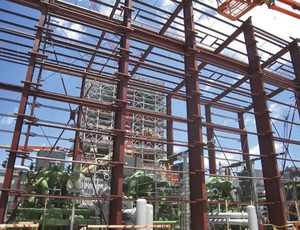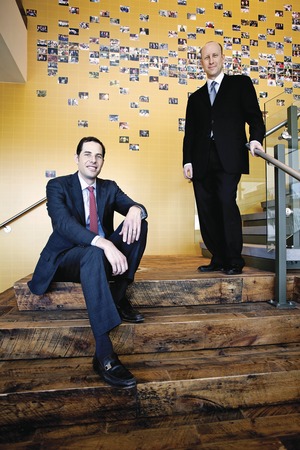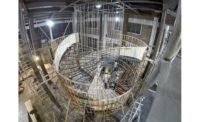


For a construction firm best known for gritty industrial and power projects, the suburban Chicago-based Graycor Inc. is spending a lot of time these days presiding over tenant fit-outs—its own, as it happens.
While the lingering slowdown has prompted flashier firms to thin their ranks or pull up stakes, Graycor has expanded—to Portage, Ind.; Charlotte, N.C.; Tempe, Ariz.; and Oak Brook Terrace, Ill., home to its new headquarters, a space every bit as steely as Graycor itself. "This isn't a showplace," observes Matthew Gray, president, gazing about the firm's reception area, a monochromatic mix of black and gray. "We're still a workshop."
Graycor is also a work in progress. In April the firm moved into a 12,000-sq-ft fabrication shop in Portage, part of a new 44,000-sq-ft operations center that manages and monitors systems for Graycor subsidiaries Graycor Industrial Constructors Inc. and Graycor Blasting Co. Inc. An expansion in Tempe came by way of joining forces with Nitti Brothers Construction to form Nitti Graycor. The merger extends the geographic reach of Graycor Construction, a subsidiary specializing in hotels and retail facilities as well as distribution centers and corporate offices.
Graycor Construction's new office in Charlotte expands its presence in a region that in April landed the firm a contract for the 42-acre, $187-million North American headquarters and manufacturing plant in Decatur, Ala., for Polyplex, a Noida, India-based manufacturer of plastic films.
The recent flurry of activity, including relocation of its own headquarters, is as much about timing as strategy for this "quiet South Side firm," as other regional players called it when it was headquartered in Homewood, a hamlet due south of Chicago.
"While competitors were spending, chasing big projects and leveraging themselves during the boom years, we were adding to cash reserves and keeping our credit strong while remaining focused on our core clients and their smaller, more difficult projects," says Gray. "When the recession hit, we were in a position to upgrade our real estate, equipment and systems under far more advantageous terms than we could have in previous years."
It's those smaller and more difficult projects that have sustained Graycor since its founding, by Gray's grandfather Edward, in 1926. "My grandfather, who was a tinkerer, used to say, 'Don't give me the big projects. Give me the tough projects no one else wants to do,'" says Gray.
"Figure out the client's problem and be there," adds Steven Gray, Graycor chief financial officer and Matthew's brother.
Staying Invisible
The philosophy is no different today, which may explain why Graycor continues to attract new business in the power and petroleum industries as well as the corporate, retail and health care sectors, even as it retains clients it has served for generations, including London-based oil company BP, for which it performed work on a refinery in Whiting, Ind., in the 1920s. "We still do work at Whiting," says Matthew.
The same is true of Lisle, Ill.-based Navistar International Corp., a firm for which Graycor expedited replacement of a mill furnace decades ago, and Oak Brook Center, a super-regional shopping center built in 1962. Having acquired Inland Construction Co., the firm that built Oakbrook Center in 1982, Graycor recently contracted to revitalize the 2-million-sq-ft facility, which Matthew can see from his office. He nods toward the window: "If we do the job right, we'll be invisible. Our job is to go in and solve the problem without creating other problems for the operation."
Such was the case with a revitalization program Graycor recently executed at the 1.2-million-sq-ft Southridge Mall in suburban Milwaukee. Matthew says the project marked a sea change for the firm because it was not only its first retail sector project to embrace design-build, a specialty of the firm, but also because the approach was endorsed by mall owner Simon Property Group, one of the nation's largest real estate firms.
Still, Steven credits the recession-proof nature of those tougher projects—including Graycor Industrial's rebuild of a blast furnace at a Severstal North America plant in Dearborn, Mich., within 100 days—for sustaining Graycor during the downturn.


















Post a comment to this article
Report Abusive Comment